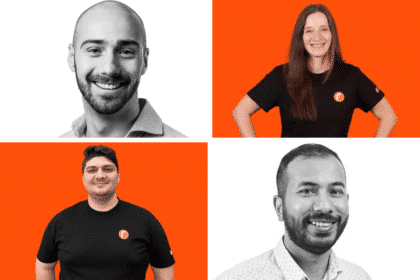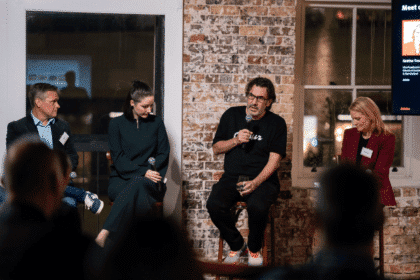Michelle Gibbings (lead image) is a workplace expert and the award-winning author of three books. Her latest book is ‘Bad Boss: What to do if you work for one, manage one or are one’. In this guest post, Gibbings talks about our tech addictions and why they are proving detrimental to your health…
If you’ve ever spent a sustained period detached from your digital device, you’ll know the joy and clarity it produces. New ideas emerge. Your brain feels genuinely rested. Too much tech in our working day can negatively impact our mental health and well-being.
A report for the European Parliament reviewed 22 prior studies on the impacts of digital technologies in the workplace and highlighted the impact of what’s called ‘technostress’. The report found that working with technology increases the probability of burnout, can negatively impact a person’s quality of life and lead to techno-addiction. The adverse effects don’t depend on the type of technology a person uses but on how the technology is used.
Research conducted by Gary Small and colleagues from the David Geffen School of Medicine at the University of California also found that frequent digital technology use significantly impacts brain functions and people’s behaviour. The negative impacts include heightened attention-deficit symptoms, impaired emotional and social intelligence and brain development, technology addiction, social isolation, and disrupted sleep.
It’s not all bad
The researchers also concluded that specific computer programs and video games might improve memory, multitasking skills, fluid intelligence, and other cognitive abilities.
Technology also facilitates the ability to work from different locations, opening up new opportunities and flexible work practises. The question to consider is – Are you controlling how you use technology to accelerate your progress, or is it controlling you and hindering your progress? Finding the optimal approach isn’t just about what you do; it’s about what the people around you do. Leaders play a crucial role, as does your organisation’s culture, which sets the standard around what’s accepted and expected.
Know the warning signs
Be alert to the warning signs of tech overload. Start noticing if your team members are working excessively long hours and if you are getting emails or online messages late into the evening. Also, look for drops in productivity, unexplained absences and changes in your team member’s behaviour. For individuals, notice if you can never switch your computer or mobile devices off and if you are constantly refreshing your email screen.
Set boundaries Economist John Pencavel from Stanford University found that productivity declines when people work more than 50 hours each week. Even worse, working 70 hours or more a week causes the person to get the same amount of work done as people who work 55 hours. His research highlights the impact of employee fatigue and stress on productivity and the probability of errors, accidents, and sickness. In contrast, research revealed that having perceived job flexibility enhances employee’s work-life balance because it provides more control over their work schedule. Setting boundaries is not a sign of weakness or a lack of commitment. It’s an essential practice for achieving success personally and professionally.
Build routines
If you consistently check emails and respond to work requests, you deny yourself the opportunity to have a real break. You are also creating a pattern of behaviour for yourself and those around you. For leaders, discuss and agree on boundaries with your team members.
Agree on what’s reasonable. Talk about how you will handle calls and emails received outside set work hours so there is time to switch off from work.
Manage the ‘too much’
It can be easy to be overwhelmed by technology options. Be selective. Ensure the tools you select are fit for purpose. Technology aids productivity, but only when the purpose and functionality align and it’s integrated into your work. Be judicious about what applications you allow to send alerts and notifications. Regularly check and remove apps from your phone that you no longer use.
Step away
Participating in online meetings all day can be exhausting. Consider that not all conversations need to be face-to-face; some are equally effective when you pick up the phone and chat.
During the day, get away from the computer and get moving. For example, put headphones on and hold your meeting while walking outside. The key is to get away from your desk because by shifting your environment, you alter your state, helping to reset your mindset and get a fresh perspective.
Avoid the book-end approach
Avoid starting and finishing your day with technology. Sleep is a critical ingredient for well-being, and technology impacts your sleep. Research shows that using technology emitting blue light stimulates the brain, making it harder to fall asleep. It can also negatively impact your circadian rhythm, reduce the amount of REM sleep you receive, and therefore impact your alertness when you wake up. Schedule your phone to switch to ‘do not disturb’ and turn off social media push notifications and email alerts at set times during the day and evening. If you need to wake up with an alarm clock, avoid the clock being your phone.
Seek real connection
Author of Four Thousand Weeks: Time Management for Mortals, Oliver Burkeman suggests that we spend so much time on our digital devices because “They’re just the places we go to seek relief from the discomfort of confronting limitation”. By limitation, he refers to our limited control over how our lives unfold.
Humans are hard-wired for connection and too much technology fuels disconnection. Spending your day at work checking out social media and ‘doomscrolling’ will not aid your productivity, mood or relationships. So, set aside regular times for social engagements and opportunities where you can share, laugh and connect away from your digital devices.








